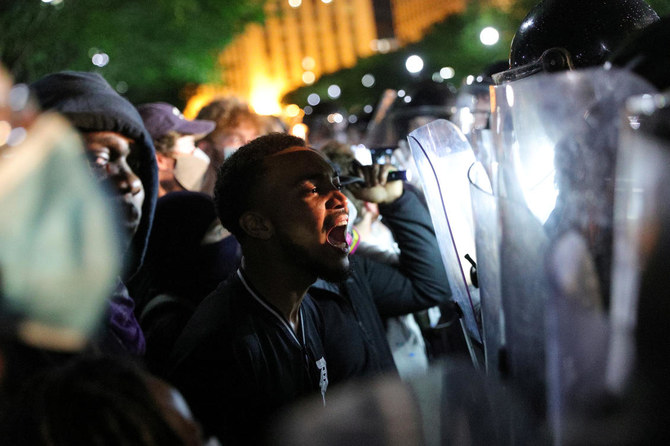ATLANTA: Georgia’s governor declared a state of emergency early Saturday to activate the state National Guard as violence flared in Atlanta and in dozens of cities nationwide following the death in Minnesota of George Floyd after a white officer pressed a knee into his neck while taking him into custody.
Another 500 Guard soldiers were mobilized in Minneapolis and surrounding cities, where Floyd died and an officer faced charges Friday in his death.
The Guard was also on standby in the District of Columbia, where a crowd grew outside the White House and chanted curses at President Donald Trump. Some protesters tried to push through barriers set up by the US Secret Service along Pennsylvania Avenue, and threw bottles and other objects at officers wearing riot gear, who responded with pepper spray.
A person was killed in downtown Detroit just before midnight after someone in an SUV fired shots into a crowd of protesters near the city’s Greektown entertainment district, police said. In Portland, Oregon, protesters attacked police headquarters Friday night and authorities said they lit a fire inside. In Virginia's capital, a police cruiser was set on fire outside Richmond police headquarters, and a city transit spokeswoman said a bus set ablaze was “a total loss,” news outlets reported.
Opinion
This section contains relevant reference points, placed in (Opinion field)
Georgia Gov. Brian Kemp said in a pair of tweets that up to 500 members of the Guard would deploy immediately “to protect people & property in Atlanta.”
He said he acted at the request of Atlanta Mayor Keisha Lance Bottoms, who earlier appealed in vain for calm.
In scenes both peaceful and violent across the nation, thousands of protesters chanted “No justice, no peace” and “Say his name. George Floyd.” They hoisted signs reading: “He said I can’t breathe. Justice for George.”
Some demonstrators smashed police cars and spray-painted the iconic logo sign at CNN headquarters. At least three officers were hurt and there were multiple arrests, Atlanta police spokesman Carlos Campos said, as protesters shot at officers with BB guns and threw bricks, bottles and knives.
Atlanta officials reported a fire at Del Frisco’s restaurant in the Buckhead neighborhood, several miles north of the protest site downtown, and officials said crews were unable to reach the fire because of protesters there.
“This is not in the spirit of Martin Luther King, Jr.,” Bottoms implored the protesters to no avail. “You are disgracing the life of George Floyd and every other person who has been killed in this country.”
Bottoms was flanked by King’s daughter, Bernice King, and rappers T.I. and Killer Mike.
“We have to be better than burning down our own homes. Because if we lose Atlanta what have we got?” said Killer Mike, who cried as he spoke.
In Minneapolis, there were scattered small fires and some stores in a strip mall were broken into near the city’s 5th Precinct.
Video posted to social media showed New York City officers using batons and shoving protesters down as they took people into custody and cleared streets. One video posted to social media showed on officer slam a woman to the ground as he walked past her in the street.
Demonstrators rocked a police van, set it ablaze, then scrawled graffiti across its charred hulk and set it on fire a second time as officers retreated from the area. Blocks away, protesters used a club to batter another police vehicle.
“We have a long night ahead of us in Brooklyn,” Mayor Bill de Blasio tweeted. “Our sole focus is deescalating this situation and getting people home safe. There will be a full review of what happened tonight. We don’t ever want to see another night like this.”
The police department said numerous officers were injured, including one who had a tooth knocked out.
Protesters in Houston, where George Floyd grew up, included 19-year-old Jimmy Ohaz, who came from the nearby city of Richmond, Texas.
“My question is how many more, how many more? I just want to live in a future where we all live in harmony and we’re not oppressed.”
Demonstrators on the West Coast blocked highways in Los Angeles and Oakland.
The San Jose Mercury News reported that Santa Clara County sheriff's deputies shot at a fleeing SUV that was shown on video striking protesters before fleeing the scene. San Jose police reported the shooting but said their officers were not involved.
Portland, Oregon, police said at least one shooting was tied to the protest, although details weren’t immediately available. Officers also said that gas was deployed after people threw projectiles at them.
Earlier, thousands of people attended a peaceful evening vigil that lasted three hours. Hundreds then began marching through downtown, with scattered vandalism along the route. Officers declared the event an “unlawful assembly” around 11 p.m., saying they would use force to disperse crowds.
About 1,000 protesters in Oakland, California, smashed windows, sprayed buildings with “Kill Cops” graffiti and were met with chemical spray from police. Oakland Police said several officers were injured by projectiles.
Several demonstrators were detained in Los Angeles and one officer received medical treatment, police said. An LAPD vehicle had its windows smashed, and CNN reported that someone wrote “killer” on a patrol car. At least one city bus was vandalized, and police declared an unlawful assembly throughout downtown.
Protesters repeatedly clashed with police in the Silicon Valley city of San Jose, said Mayor Sam Liccardo, and police responded with flash-bang grenades and rubber bullets. One officer was being treated at a hospital for an injury that was not life-threatening, he and police officials said.
Liccardo said his own officers shared the community’s outrage over Floyd’s in-custody death.
“It was a horrible injustice. I’d venture to guess that every police officer out there feels much of the same anger about what happened in Minneapolis,” he told The Associated Press.

















